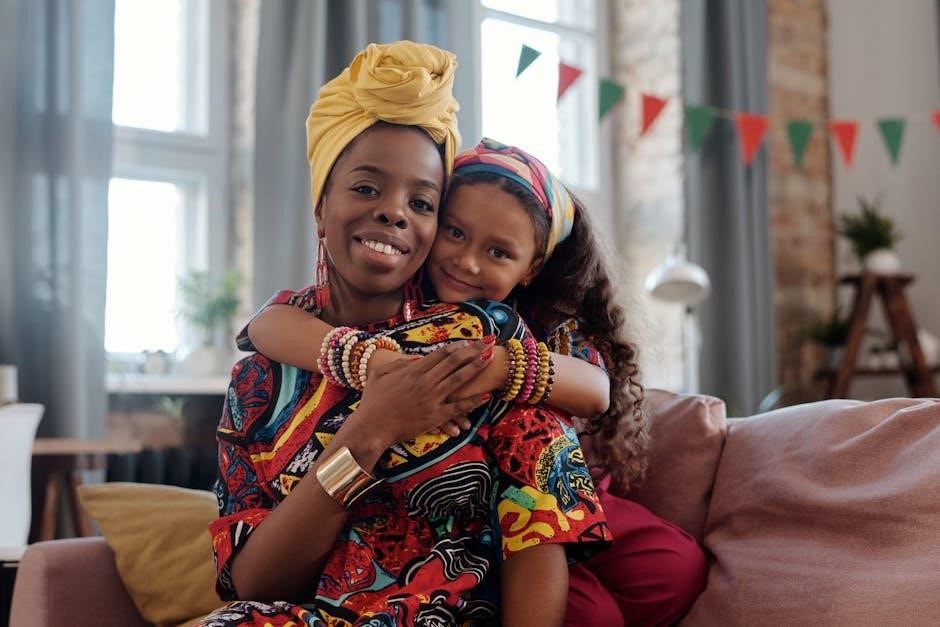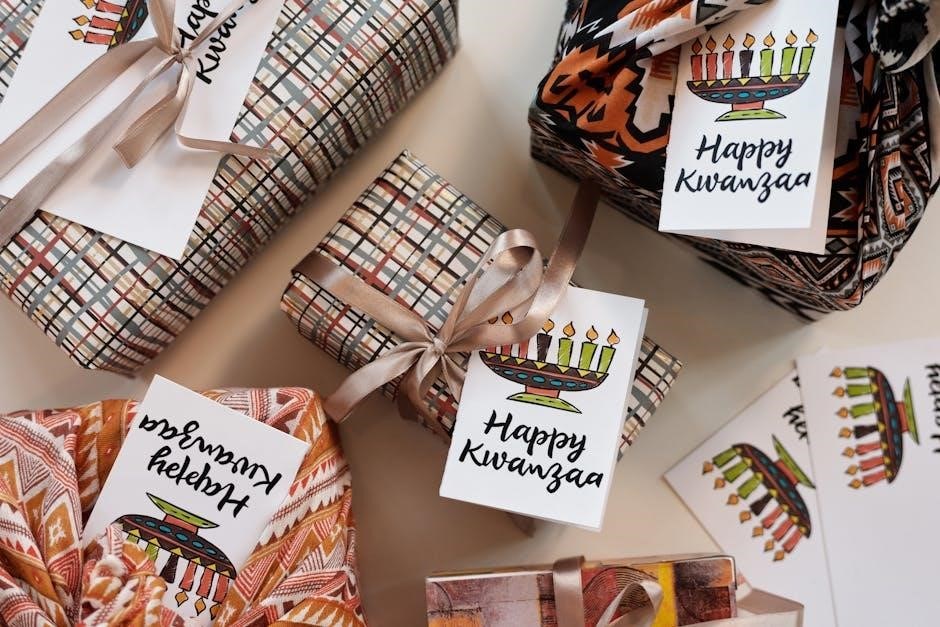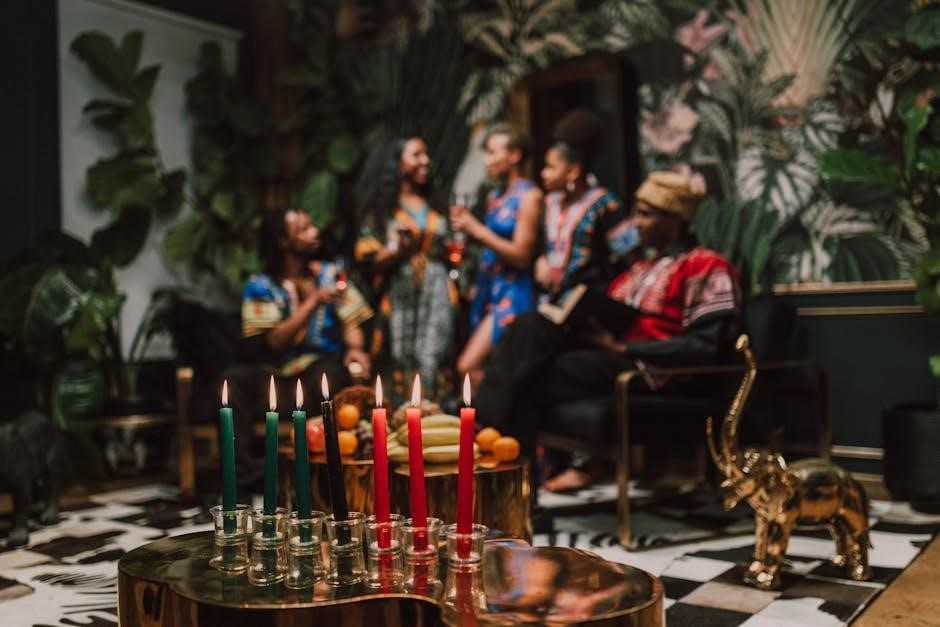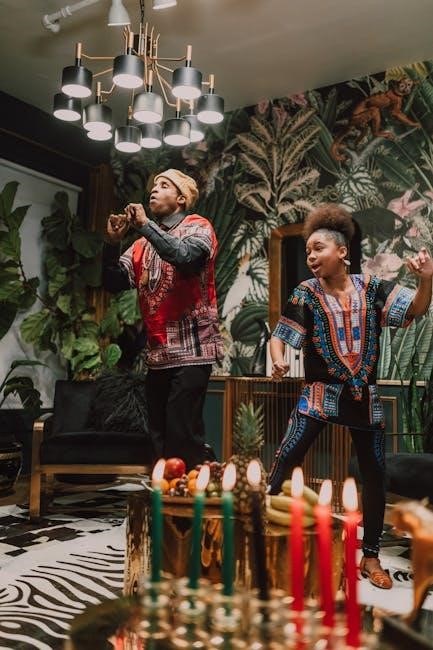kwanzaa principles pdf

Kwanzaa‚ a week-long celebration honoring African American culture‚ is rooted in seven core principles known as Nguzo Saba. These principles emphasize unity‚ self-determination‚ and collective responsibility‚ fostering a strong sense of community and cultural identity.
Overview of Kwanzaa and Its Significance
Kwanzaa‚ celebrated from December 26 to January 1‚ is a seven-day holiday honoring African heritage and culture. It emphasizes family‚ community‚ and the seven principles known as Nguzo Saba‚ which guide ethical living. Kwanzaa fosters unity‚ self-determination‚ and collective responsibility‚ reflecting values central to African traditions. Originating in 1966‚ it serves as a time for reflection‚ renewal‚ and celebration of cultural identity. Traditions include lighting candles (Mishumaa Saba)‚ reciting principles‚ and engaging in rituals like the feast (Karamu). Kwanzaa’s significance lies in its promotion of unity and purpose‚ offering a framework for personal and communal growth.
Importance of the Seven Principles (Nguzo Saba)
The Nguzo Saba‚ or Seven Principles‚ are the foundation of Kwanzaa‚ guiding individuals and communities toward ethical and purposeful living. Each principle—Umoja‚ Kujichagulia‚ Ujima‚ Ujamaa‚ Nia‚ Kuumba‚ and Imani—addresses essential values for personal growth and collective empowerment. These principles promote unity‚ self-determination‚ and creativity‚ fostering a sense of responsibility and faith. By embracing these values‚ individuals strengthen their families and communities‚ contributing to a more just and harmonious society. The principles are not only celebrated during Kwanzaa but are meant to be applied year-round‚ ensuring their transformative impact endures beyond the holiday.

History of Kwanzaa
Kwanzaa was created in 1966 by Maulana Karenga to provide African Americans with a cultural holiday. It draws from African harvest traditions‚ emphasizing community and heritage renewal.
Origins of Kwanzaa and Its Founder
Kwanzaa was created in 1966 by Maulana Karenga‚ an African-American scholar and activist‚ as part of the Black Freedom Movement. It is inspired by African harvest festivals‚ emphasizing community‚ culture‚ and heritage. Karenga designed Kwanzaa to promote unity and pride among African Americans‚ drawing from Swahili and African traditions. The name “Kwanzaa” comes from the Swahili phrase “matunda ya kwanza‚” meaning “first fruits.” Karenga structured the celebration around seven principles‚ Nguzo Saba‚ reflecting African values. Kwanzaa’s origins are deeply rooted in the quest for cultural identity and empowerment during a pivotal time in American history.
Evolution of Kwanzaa as a Cultural Celebration
Since its inception in 1966‚ Kwanzaa has evolved from a local African-American celebration to a widely recognized cultural event. Initially focused on Black Nationalist ideals‚ it has expanded to embrace diverse communities worldwide. The holiday has become a unifying force‚ blending African traditions with contemporary practices. Over the years‚ Kwanzaa has been incorporated into school curricula‚ community events‚ and interfaith gatherings‚ fostering cross-cultural understanding. Its principles‚ such as unity and self-determination‚ have resonated globally‚ inspiring social and cultural movements. Today‚ Kwanzaa is celebrated by millions‚ symbolizing a enduring commitment to African heritage and the universal values of family‚ community‚ and collective progress.

The Seven Principles of Kwanzaa
The Nguzo Saba‚ or Seven Principles‚ are the foundation of Kwanzaa‚ emphasizing unity‚ self-determination‚ and collective responsibility. Each principle‚ rooted in African values‚ guides ethical living and community empowerment year-round.
Umoja (Unity)
Umoja‚ the first principle of Kwanzaa‚ emphasizes unity within the family‚ community‚ nation‚ and race. It teaches the importance of togetherness and collective strength‚ reminding individuals that unity fosters growth and resilience. Celebrants reflect on how unity strengthens bonds and promotes shared goals. During Kwanzaa‚ the first candle‚ the black candle‚ is lit to symbolize Umoja‚ representing the foundation of African heritage and the unity of all people. This principle encourages collaboration and mutual support‚ reinforcing the idea that collective efforts lead to a stronger‚ more harmonious community. Unity is not just a value but a practice that sustains and empowers individuals and groups alike.
Kujichagulia (Self-Determination)
Kujichagulia‚ the second principle‚ focuses on self-determination‚ encouraging individuals to define and speak for themselves. It emphasizes the importance of cultural identity and autonomy‚ urging people to take charge of their lives and communities. This principle was particularly significant during the Civil Rights Movement‚ as it inspired African Americans to reclaim their heritage and assert their rights. During Kwanzaa‚ the red candle symbolizes the struggles and sacrifices made to achieve self-determination. By embracing this principle‚ individuals and communities foster a sense of empowerment and self-respect‚ laying the groundwork for future generations to thrive and maintain their cultural integrity.
Ujima (Collective Work and Responsibility)
Ujima‚ the third principle‚ emphasizes collective work and responsibility. It calls for individuals to come together to address challenges and build stronger communities. This principle encourages shared efforts to achieve common goals‚ fostering a sense of accountability and mutual support. During Kwanzaa‚ families and communities often engage in group activities or service projects to embody Ujima. By working collectively‚ individuals honor the spirit of collaboration and reinforce the idea that the well-being of one is tied to the well-being of all. Ujima inspires unity in action‚ promoting a culture of togetherness and shared progress.
Ujamaa (Cooperative Economics)
Ujamaa‚ the fourth principle‚ focuses on cooperative economics‚ emphasizing the importance of shared wealth and resources within the community. It encourages collective ownership and mutual aid‚ promoting economic empowerment through collaboration. By supporting local businesses and pooling resources‚ individuals uphold Ujamaa‚ fostering financial stability and reducing disparities. This principle reflects the value of working together to create a thriving economy that benefits everyone‚ not just the privileged few. Ujamaa aligns with the broader goal of building strong‚ self-sufficient communities where prosperity is shared and accessible to all. It underscores the importance of ethical and equitable economic practices that prioritize collective well-being.
Nia (Purpose)
Nia‚ the fifth principle‚ revolves around the concept of purpose‚ encouraging individuals to strive for collective goals and shared aspirations. It emphasizes the importance of having a clear direction and commitment to the well-being of the community. By fostering a sense of responsibility and focus‚ Nia helps individuals align their actions with the greater good. This principle is about creating meaningful objectives that benefit not just oneself‚ but also future generations. Through Nia‚ people are inspired to work toward a common vision‚ fostering unity and progress within their communities. It is a call to live intentionally and purposefully.
Kuumba (Creativity)
Kuumba‚ the sixth principle‚ emphasizes the importance of creativity and self-expression. It encourages individuals to find innovative ways to improve their communities and honor African heritage. By embracing creativity‚ people can transform challenges into opportunities and foster cultural growth. Kuumba is not just about art but also about problem-solving and resourcefulness. During Kwanzaa‚ this principle is often celebrated through art‚ music‚ and decorations that reflect African traditions. It reminds individuals to think imaginatively and contribute to the betterment of society. Creativity is seen as a tool for preserving and advancing cultural values‚ ensuring a vibrant future for generations to come.
Imani (Faith)
Imani‚ the seventh principle‚ signifies faith and trust in oneself‚ others‚ and the community. It emphasizes maintaining a strong belief in the collective power of unity and the ideals of Kwanzaa. Faith is not limited to religious beliefs but extends to trusting in the potential of individuals and communities to create positive change. During Kwanzaa‚ Imani is reflected in the commitment to uphold the other six principles and work toward a brighter future. It serves as a reminder to stay resilient‚ hopeful‚ and dedicated to the well-being of all people. Faith is the foundation that sustains and guides individuals through challenges and celebrations alike.

Cultural and Community Aspects of Kwanzaa
Kwanzaa strengthens cultural bonds and fosters community unity through shared traditions‚ rituals‚ and reflections on the Nguzo Saba principles‚ promoting collective growth and cultural identity.
Role of Family and Community in Celebrating Kwanzaa
Family and community are central to Kwanzaa‚ as they come together to honor the Nguzo Saba principles. These gatherings reinforce values like unity‚ self-determination‚ and collective responsibility. Traditions such as lighting the kinara and discussing each principle daily create a shared cultural experience. Families often involve children in activities‚ teaching them about African heritage and the importance of community. Elders play a key role in sharing stories and leading discussions‚ ensuring the principles are passed down. The communal feast‚ Karamu‚ strengthens bonds and celebrates collective achievements. Through these practices‚ Kwanzaa fosters a sense of belonging and unity‚ emphasizing the strength of family and community ties.
Traditions and Rituals Associated with the Principles
Kwanzaa traditions and rituals are deeply connected to the seven principles‚ fostering a meaningful celebration. Each day begins with lighting the kinara‚ symbolizing the seven principles. The libation ceremony honors ancestors‚ while the recitation of African proverbs and principles reinforces their significance. The mishumaa saba (seven candles) represent the Nguzo Saba‚ with one candle lit each day. The Karamu feast on the sixth day celebrates community and culture. These rituals emphasize unity‚ creativity‚ and faith‚ grounding the celebration in African heritage and values. Through these practices‚ individuals reflect on the principles‚ fostering personal growth and collective strength.

Modern Relevance of Kwanzaa Principles
Kwanzaa’s principles remain vital today‚ promoting unity‚ self-determination‚ and collective responsibility. They inspire personal growth and community empowerment‚ offering timeless values for modern societal challenges and cultural identity.
Applying the Principles in Daily Life
Applying Kwanzaa principles in daily life fosters personal growth and strengthens communities. Unity (Umoja) encourages collaboration and togetherness in families and neighborhoods. Self-determination (Kujichagulia) promotes individual empowerment and cultural pride. Through collective work (Ujima)‚ communities address challenges collectively‚ while cooperative economics (Ujamaa) support local businesses‚ building economic strength. Purpose (Nia) guides individuals toward meaningful goals‚ and creativity (Kuumba) inspires innovation and problem-solving. Faith (Imani) reinforces trust in oneself‚ others‚ and the community. These principles‚ when embraced daily‚ create a foundation for positive change and enduring cultural values.
Impact of Kwanzaa on Social and Cultural Movements
Kwanzaa has significantly influenced social and cultural movements by promoting unity‚ self-determination‚ and collective responsibility. Its principles have inspired initiatives addressing racial justice‚ education‚ and economic empowerment‚ fostering community-driven solutions. The emphasis on cooperative economics (Ujamaa) has encouraged support for Black-owned businesses‚ while self-determination (Kujichagulia) has fueled movements advocating for cultural identity and pride. Kwanzaa’s values align with broader social justice efforts‚ emphasizing the importance of collective action and faith (Imani) in creating positive change. By grounding these principles in African heritage‚ Kwanzaa has become a powerful symbol of resilience and unity‚ shaping cultural movements and inspiring social progress globally.
Kwanzaa’s principles offer timeless wisdom for unity‚ empowerment‚ and cultural pride‚ inspiring individuals and communities to embody these values beyond the celebration.
Final Thoughts on the Significance of Kwanzaa Principles
Kwanzaa’s principles‚ known as Nguzo Saba‚ hold profound significance as a foundation for personal growth and community empowerment. They emphasize unity‚ self-determination‚ and collective responsibility‚ fostering strength and resilience. By reflecting on these principles annually‚ individuals reconnect with their heritage while building a stronger future. The values promoted during Kwanzaa transcend the holiday itself‚ offering guidance for daily life and cultural preservation. Embracing these principles year-round can lead to greater unity and prosperity within communities‚ ensuring a lasting legacy of African heritage and cultural pride.
Call to Action for Embracing the Nguzo Saba Year-Round
Embracing the Nguzo Saba beyond Kwanzaa fosters a culture of continuous growth and unity. Individuals are encouraged to integrate these principles into daily life‚ promoting self-determination and collective responsibility. Communities can organize workshops‚ discussions‚ and initiatives that uphold these values‚ ensuring their relevance and impact throughout the year. By committing to the Nguzo Saba‚ we honor African heritage while building a brighter‚ more united future. Let us strive to embody these principles every day‚ creating a lasting legacy of strength and resilience for generations to come.